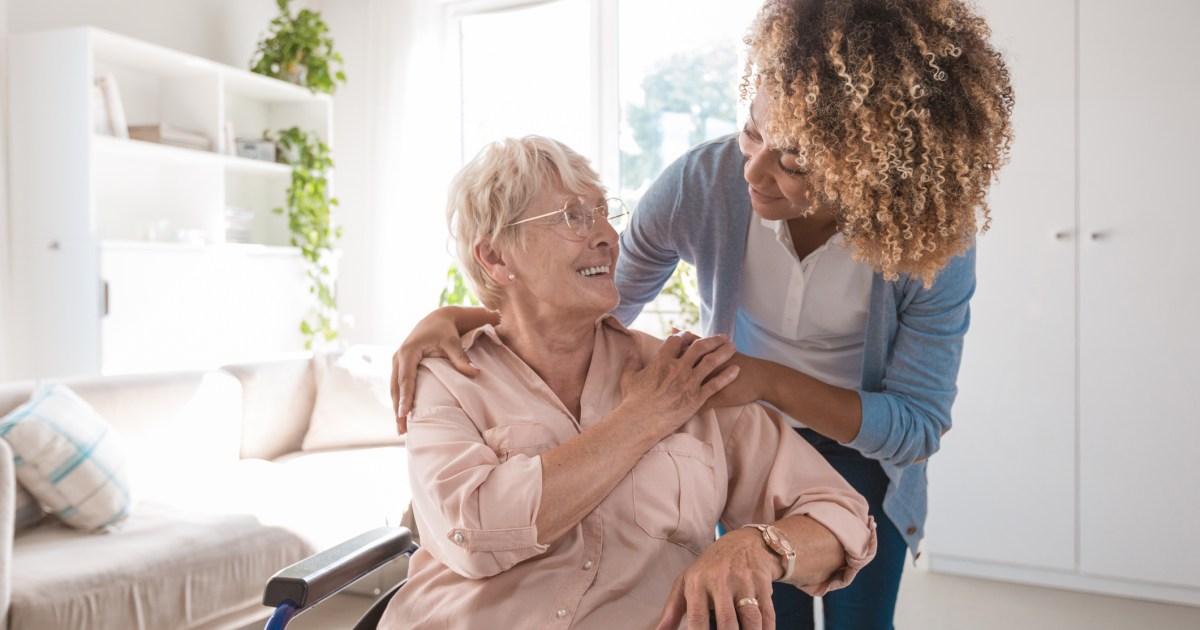To take care of an elderly patient with Alzheimer’s disease at home is a humanitarian task that is not an easy task, and perhaps only those who have passed through it will appreciate its weight.
The Alzheimer’s patient, if he is a member of your family, does not constitute a burden as much as he turns into an angry and lost child at other times, and between them there are many troubles, pains and arduous tasks that require constant care and supervision.
So if one of your family members has Alzheimer’s, the whole family should know some basic information about the disease and its development and how to care for the patient at home to keep his life from harm and to avoid the deterioration of his health.
The difference between dementia and Alzheimer’s
You may first need to know the difference between dementia and Alzheimer’s.
Dementia is a general term that refers to a severe deterioration in mental ability that affects daily life. As for Alzheimer’s, it is the most common cause of dementia.
Dementia has a range of symptoms associated with decreased memory, logical thinking or other thinking skills. There are different types of dementia, and it is caused by many conditions.
and mixed dementia A condition in which brain changes occur in more than one type of dementia at a time. Alzheimer’s is the most common cause of dementia, accounting for 60-80% of dementia cases, according to the Alzheimer’s Association website.
Dementia is not a normal part of aging. It is caused by damage to brain cells that affects their ability to communicate, which can affect thinking, behavior and feelings.
Alzheimer’s
It is a degenerative brain disease that results from complex changes in the brain following cell damage.
It leads to symptoms of dementia that gradually worsen over time. Its most common early symptom is difficulty remembering new information because the disease usually affects the part of the brain associated with learning first.
As the disease progresses, symptoms become more severe and include confusion and changes in behavior. Eventually, speaking, swallowing, and walking become more difficult.
Although most people with Alzheimer’s are 65 or older, nearly 200,000 Americans under 65 have Alzheimer’s.
The three stages of dementia
Neither family members nor the patient themselves may notice the first symptoms of dementia, until it becomes an inevitable reality.
After a diagnosis of dementia, it usually follows a downward path of 3 steps.
in mild dementiaPeople may have difficulty remembering words and names, learning and remembering new information, and planning and managing complex activities such as driving.
They may also experience sadness, anxiety, loss of interest in pleasurable activities, and other symptoms such as major depression.
In mild dementiaPhysical and sensory functions are usually affected, and this may appear clearly in personal hygiene, inappropriate words, severe behavior with those around, and constant wandering.
At this stage, the patient needs to contain and accept behaviors calmly and compassionately, without blaming, criticizing, or reminding that the patient has forgotten to do something that is self-evident such as taking care of daily personal hygiene.
When your loved one is injured, be careful not to pass judgment on him, remember that you are caring for the elderly with the behavior of a child. It is definitely a huge emotional and physical challenge.
“When a patient goes from mild to moderate dementia, some home modifications are often required that may include removing carpets, installing safety locks and adding bed barriers in the Sleep to protect the patient from falling during sleep, and secure windows and balconies.
This is also the time when the palliative care team must be brought in to support family members in managing behaviours. The family alone cannot do all the tasks alone, and you may need the helping hand of professionals to help the patient significantly relieve symptoms.
severe dementia, there may be severe memory loss, or limited movement that may become absent, with difficulty swallowing, and problems in controlling the intestines and bladder, which means the habit of urination and involuntary defecation.
At this stage, the patient may have difficulty recognizing family members and caregivers.
Why should specialists be hired?
Family members, who experience high levels of stress during the moderate and severe stages as well, may deal with anticipatory grief associated with feeling the impending loss of their loved one.
Experts warn that family members who care for a dementia patient and don’t get the help of psychologists and behavioral therapists may be more likely to experience a long and complex period of grief after the death of their loved one.
According to the Mayoclinic website, if you are caring for someone with Alzheimer’s disease or related dementia, your role in managing daily tasks will increase as the disease progresses. Consider practical tips that can help a person with dementia be as involved as possible and enable you to manage tasks effectively.
Reduce frustration
A person with dementia may become nervous when tasks that were once simple become difficult.
To reduce challenges and ease frustration:
- Establish a daily routine, Include some tasks, such as showering or medical and medication appointments, and introduce this routine when the patient is most alert and refreshed.
- take your time, Anticipate that tasks may take longer than they used to, and schedule more time for them.
- Give yourself time to rest, You will not be able to do all of the patient care tasks on your own, and take time to rest between daily tasks.
- involve the patient, Allow the person with dementia to do tasks on their own, such as dressing independently or making the bed or the table.
- make choices, Make sure there are only two options like “Do you prefer a hot or cold drink” or ask if he prefers to go for a walk or watch a movie.
- give simple instructions, It is best for people with dementia to understand clear communication in one step. Avoid complex commands that require you to do more than one task at the same time.
- reduce naps, Avoid multiple or prolonged naps during the day. This can reduce the risk of falling asleep at night.
- reduce distractions, Turn off the television and reduce other distractions at mealtimes and during conversations to make it easier for a person with dementia to focus.
- create a safe environment, To enhance safety: Avoid carpets, electrical wires, and any clutter that may cause falls, and install handrails or grab bars in critical areas such as the bathroom.
- use locks, Install locks on cabinets that contain anything potentially dangerous, such as medicines, alcohol, guns, toxic cleaning materials, and dangerous tools.
- check the water temperature, Lower the thermostat on the hot water heater to prevent burns.
- Take fire safety precautions, And keep matches and lighters out of reach.
- If the person with dementia smokes, be sure to always supervise smoking.
- Be sure to install smoke and fire sensors, and make sure you have an indoor fire extinguisher close at hand.



